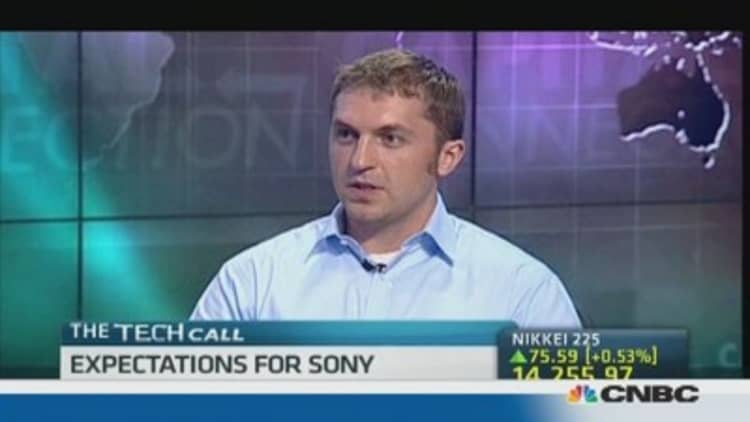
Sony is hacking off its long-ailing computer and television businesses, stepping up its restructuring efforts, but it isn't clear whether that will be enough to restore the health of the one-time consumer electronics kingpin.
"It's fairly clear they need to fix electronics," Damien Thong, senior analyst for Japanese technology at Macquarie, told CNBC before the company's results were announced. "Sony has to take its brand power (and) basically re-establish its premium positioning and cut away the fat that's dragging down its profitability."
(Read more: Sony exits PC business, warns of full-year loss)
At its quarterly earnings announcement, Sony said it plans to sell its struggling PC unit to Japan Industrial Partners, a Japanese fund that buys up restructuring businesses. It also plans to spin off its TV manufacturing business, responsible for $7.5 billion in losses over the last 10 years, by July.
The company also plans to cut around 5,000 jobs in its TV, computer, marketing and other departments. Sony expects the major restructuring measures will push the company to a 110 billion yen ($1.08 billion) loss for this fiscal year, with additional restructuring costs of around 70 billion yen to kick in next fiscal year.
It isn't clear whether these moves will be enough to re-capture the flag in a segment that's become increasingly fast-moving and fickle, but some analysts are casting hopeful eyes over Sony's relatively successful moves with smartphones and the PlayStation game consoles.
(Read more: Sony close to making a profit on PlayStation 4)
But those segments face uphill battles.
The smartphone business has been "battered" over the years and Sony's market share is small, said Bryan Ma, associate vice president for devices research at IDC Asia-Pacific, citing the difficulty of getting shelf space and buzz for products against the Samsung and Apple dominance.
He noted Sony was in seventh place globally in the July to September period with 4 percent of the smartphone market, compared with Samsung's 33 percent and Apple's 13 percent. But on the plus side, it was up from only half a percent share of the global smartphone market in 2009, he said.
(Read more: Clock ticking for Sony to prove it can turn around)
"From a design perspective, these are very nice products," Ma said of Sony's offerings, citing the Xperia smartphone line and the QX lenses which can be attached to smartphone cameras. "If they continue to engineer along this path, some of these products may turn into a mass-market hit," Ma said.
But he added, "just because one has a well-designed product is no guarantee of success," with Sony's own failure with its Betamax videotape player a cautionary tale.
The Betamax was a videotape player sold in the 1970s and 1980s; although the player and its recording format were widely considered superior to the rival VHS format on sound, image, and quality, the Betamax's higher price and Sony's failure to embrace licensing the technology to other manufacturers prevented it from achieving broad acceptance.

To be sure, the fickle market—and the short replacement cycle for smartphones—plaguing Sony could also work in its favor.
"People change their smartphones very quickly and their tastes change just as fast," Mykola Golovko, global consumer electronics industry analyst at Euromonitor, told CNBC, citing how quickly Blackberry was sidelined. "This can change for Sony; it can change for any other company very quickly. It's a very dangerous thing to count anyone out of that market."
But he added, "the main test is how sustainable is (Sony's) growth in smartphones; where do they plateau in market share?"
(Read more: Sony rejects Dan Loeb's spin off proposal)
Others hope Sony can make up for some missed opportunities.
"One of the challenges that Sony's had for a long time is they've never really leveraged all their content assets into their device assets. They really have been treated as very separate companies," Bob O'Donnell, chief analyst at Technalysis Research, told CNBC.
"The one benefit that Sony has that, for example, Samsung does not have is access to all this content. Even Apple is just a repository for other people's content," O'Donnell said. "Theoretically, they should be able to figure out a way to leverage some of that across whatever devices they chose to stay in."
—By CNBC's Leslie Shaffer. Follow her on Twitter @LeslieShaffer1

